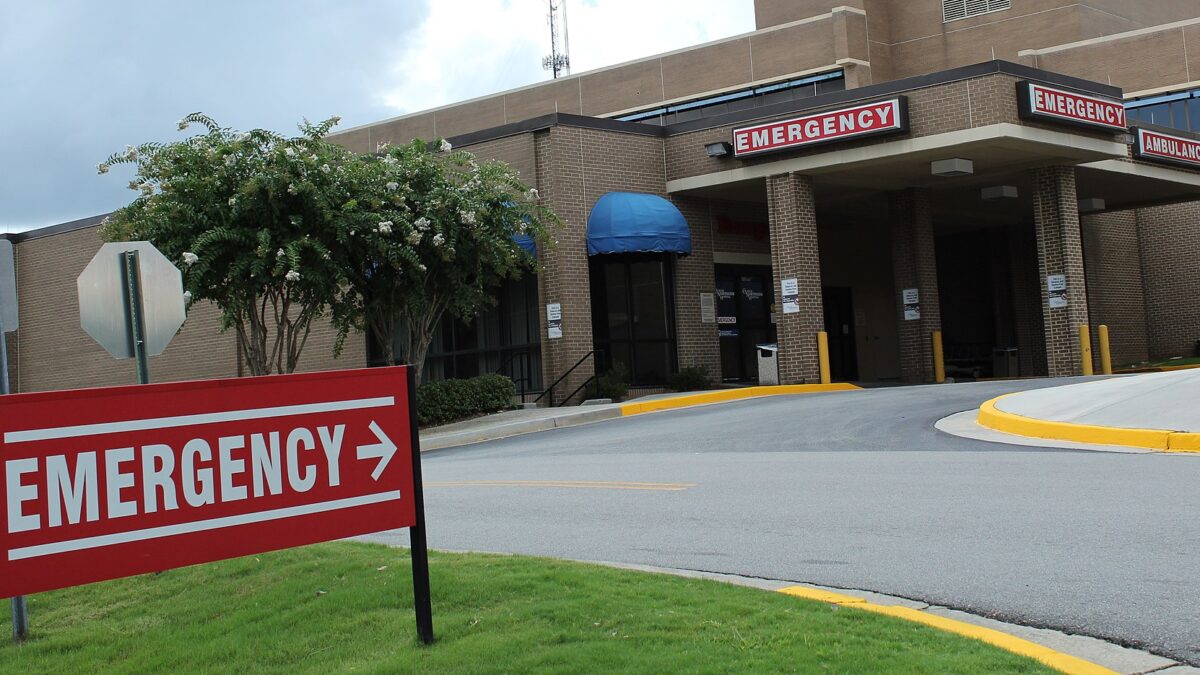
“Madelynn*, time to go!”
My five-year-old springs up from the book she is reading. She hurries to the door, her eyes bright with excitement behind her pink bifocals. It’s only an eye doctor’s appointment, but she has been waiting for this moment all morning. Maybe it’s just the thrill of doing something a little out of our ordinary routine. I have a suspicion, though, that she rather likes being the center of attention in the doctor’s chair.
The doctor is running a bit behind when we arrive, so Maddie heads for the Legos. Her fine-motor skills are not the greatest, likely due to her eye problems, but she manages pretty well and proudly shows me her accomplishments. Another woman in the room, watching from behind as she works, points at Maddie’s blonde head and comments on how thick her hair is. “Yes,” I answer, “that comes from her daddy’s side of the family.” What I don’t mention is that this thickness may come in handy if she ever develops a self-conscious side, as it helps hide the long, zig-zag scar that runs across the top of her head from ear to ear.
Maddie shows no lack of self-confidence at this age, however, and keeps us all entertained with little quips throughout our visit. During her eye exam, the doctor tries to get her to focus on a picture of a little bird by asking various questions about it. “Does it have eyelashes?” she asks. “No,” Maddie answers, in a tone implying that this is a very silly idea. “It’s just a chicken!” Later, when the doctor keeps repeating that she should “look at the ‘E’” on the page, Maddie states dryly, “I am.”
The doctor laughs. “I feel like you’re getting mad at me,” she teases.
“I doubt it,” I comment. “She’s just very straightforward.”
Flaws Don’t Prevent a Beautiful Life
Perhaps Maddie’s straightforwardness is due in part to the good dose of reality she had at a young age. Maddie was born with a condition called craniosynostosis, a birth defect of sometimes genetic, but often unknown cause, in which two or more of the plates of the skull fuse together, restricting brain growth. She underwent surgery at seven months old to correct it, a procedure which necessitated that long incision across the top of her head, and dissembling and reconstruction a major portion of her skull. It was as terrifying and amazing as it sounds.
As a side-effect of this condition, Maddie’s eyes have never been properly aligned. She has been through two additional surgeries now in an attempt to fix this problem, unfortunately with limited success. Her eyes still turn inward on one another most of the time, hindering her ability to use them together. Hence the visit to the vision therapist this morning.
After a detailed exam, the doctor leans back on her stool and presents me with the situation. Maddie’s eyes are seeing fairly well individually, but still not working together. Our options at this point are either therapy or more surgery, but neither come with any guarantee of success. This is never a pleasant thing for a parent to hear, but the doctor points my attention back to the positives. Maddie is still a bright, happy child who is developing normally in most areas. We will obviously do whatever we can to help, but this physical flaw is not going to prevent her from living a fulfilling life.
I Would Do It All Over Again
As Maddie and I arrive back home, I sit down to check my email. There is a survey waiting for me, as there often is, from an organization that does opinion polling on a variety of subjects. This particular survey, which purports to be about “women’s health,” starts out with a rather personal question: Have I ever had an unintended pregnancy? I pause for a moment, but answer that yes, I have.
My husband and I had been married a little over three years when we discovered that I was expecting Madelynn. We had already had two children in that short time (not twins), so by her birth, Maddie would be our third child in four years. My husband and I both have a positive view of children, but this had not exactly been our plan. Thankfully, our finances at the time were sufficient for me to stay at home with the children, but this came at the cost of my husband being out of town on business almost more days than not. Between his hectic schedule, the exhaustion and stress of two small children, and a number of other factors, our relationship was feeling the strain. Suffice it to say this was not, in our minds, a good time to be having another baby.
The next question on the survey is even more personal: Did I continue my unintended pregnancy, or did I terminate it? Obviously, the reader knows the answer. Despite the factors I just mentioned, the alternative was never really an option in my mind. Yet I wouldn’t say this was an easy road, and that is where further questions begin to lead. What kind of effects did my pregnancy have on me? Were they positive or negative? How did they affect my life overall?
This was the first time I have ever considered these questions in the context of my daughter being called an “unintended pregnancy.” I found them hard to answer. Was the pregnancy itself difficult? Sure. Caring for two tiny children mostly alone while pregnant is not a tremendous hardship, but I don’t know many women who would describe it as easy. Were the effects on my marriage difficult? Absolutely. The year or two following that positive pregnancy test was undoubtedly the most trying period of our (now nearly ten-year) marriage. Was it difficult to watch Maddie struggle through the challenges her birth defect presented? Incredibly. Would I do it all over again to see that bright, toothy grin and those beautiful, long-lashed eyes? In a heartbeat.
What About Accepting People Who Aren’t Perfect?
The thing is, I never actually saw my little girl as an “unintended pregnancy.” Although her appearance may have seemed inconvenient, I saw her as a little human from the moment I knew she existed. She was never a mere part of my body, but her own little being, with her own unique DNA—wired with the genes to make her blonde hair, her cheesy grin, and even that funny sneeze reflex she has when exposed to bright light. (She got that from her daddy, too.) Although the timing and circumstance of her arrival may not have been the most comfortable, they did not make her any less human or worthy of life than either of our other children.
Although I didn’t know it at the time (and still don’t know for sure), it is possible that Maddie’s DNA also contained the defect causing the abnormal growth of her head and eyes. To my knowledge, there is no prenatal test for this sort of thing, but it would not surprise me if there were someday. Such a test would be beneficial in some ways, but I fear it could result in some parents deciding they didn’t want a child like my little girl.
As my friends whose children have much severe forms of craniosynostosis could tell you, our culture is not very welcoming of children who appear less than “normal.” As much as we Americans pride ourselves on accepting everyone no matter what their physical appearance or IQ, many of us are obviously uncomfortable with children who look or act a bit “different.” This bias shows astonishingly clearly in the high abortion rates of children with Down syndrome. Yet I doubt many of us realize just how common it is to have a child with a so-called “birth defect.” Approximately 1 in 33 children are born with physical abnormalities, from Down syndrome to craniosynostosis to webbed toes. Birth defects can vary widely in severity, of course, from having no practical side effects to ultimately being fatal. But is there really a point at which we can draw a line and say their condition negates their human rights? How can one human possibly determine whether another human, by virtue of nothing other than his or her physical makeup, is worthy of life or death?
And how can we truly know what the future might be like if we kept more of these unwanted children? I ponder this as I read this article just after finishing my survey. The author argues in favor of a woman’s right to abort babies with Down syndrome, despite having a daughter with this condition herself. The only reason her daughter was spared, she says, is that the girl was not diagnosed until birth—she would have been aborted otherwise.
At the same time, however, this woman is “beyond grateful” that she did not receive the diagnosis earlier, because her daughter is dearly loved and apparently totally worth every effort. So… she is grateful that she was never presented with the choice to abort, since she can now see her beautiful little girl. Yet she is adamant that other women, who can’t see their children, should have the same choice she is glad she did not have? I fail to understand the logic.
The Rest of the Story Awaits
What if, rather than relying on our short-sighted, limited perspective, we realized that we can’t possibly know the future or see what good might come of even a painful situation? I understand that my own experience with unexpected pregnancy and birth defects pales in comparison to many other stories. But when I look in my daughter’s eyes, I can’t help but think that what may seem a burden in the short term can still become a joy in the long term.
How many parents do you know who would actually say they wish they had aborted their unexpected or “imperfect” child? Even the author of the above article couldn’t say this. Some women don’t regret their abortions, of course, but there is no way of knowing what their alternative story would have been. I, for one, can’t imagine what my life would have been like without my sweet, precocious little fighter—my girl who loves attention and always speaks her mind. As I answered on my survey, I am a better person, with a better life (and even a better marriage) because of her existence. I wonder how many more parents would have said the same if only they could have seen the rest of the story.
I realize there are many facets to this discussion, and I don’t pretend to have all the answers. But I believe we need to start by respecting human life, rather than thinking of it as an option. Like the author of the article above, I’m thankful I never struggled with the choice many women face. I didn’t have to, because I believed that choice had already been made for me when my daughter came into existence.
No matter how we may feel about having a baby at a particular time or with a particular problem, our children are not any less human because of our feelings or worries about the future. Perhaps if we quit thinking we had the right and even responsibility to play god with the lives of innocent human beings, we would never have to make such loathsome choices.
Life will always be a struggle in one way or another. No matter the length of the journey, we all have an appointment with death in the end, and we will all experience some measure of sorrow and pain along the way. We cannot save ourselves or our children from this fate. But we can provide a chance—a chance to fight, a chance to grow, a chance to experience laughter and love. Is that not a chance every child deserves?
* Pseudonym.









